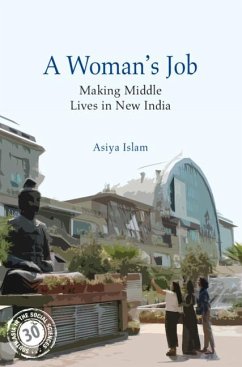Against the backdrop of rapid socio-economic change in post-1990 India, scholars and policy makers have expressed surprise at the low rate of women's participation in the workforce, particularly in urban areas. A Woman's Job presents a unique urban ethnography of young lower middle class women's lives in Delhi as they weave in and out of service employment, education, and domestic contracts. Urban, educated, and skilled, these young women seek employment in cafes, malls, call centres, and offices in the globalising landscape of Delhi. Their participation in work enables access to 'things', such as, jeans, smartphones, English language, and the metro, that symbolise global modernity. However, caught in a web of gender, class, and caste inequalities, their identification as 'working' women also generates social anxieties. The book shows how women adopt 'middle-ness' as a strategy of life-making at the multiple sites of work, home, and leisure.
Hinweis: Dieser Artikel kann nur an eine deutsche Lieferadresse ausgeliefert werden.
Hinweis: Dieser Artikel kann nur an eine deutsche Lieferadresse ausgeliefert werden.

